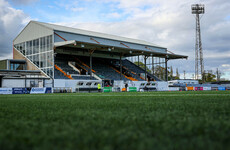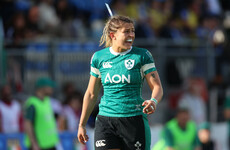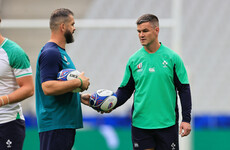Updated at 10.31
PIERCE O’CALLAGHAN is a former racewalker who won 16 Irish national titles, with his career in athletics coinciding to some degree with Sonia O’Sullivan’s. He is a sports historian, statistician and also works in sports administration, earlier this year being appointed director of readiness for 2019 IAAF World Championships in Doha.
Give us your thoughts on Sonia’s legacy.
You’d go back to the beginning, even in her teenage years. She dabbled in a number of events. I remember reading an article about her, about the first time she came to attention, she medalled in middle-distance running and also race-walking in the Munster Schools Championships. She had a big endurance base, so she could transfer her skills anywhere.
In the early days, she made two big breakthroughs, she won the national senior cross-country as a young girl. She was only 17. It would have been longer distance, she would have been taking on hardened senior athletes and she would have been unknown out of her own small circle in Cork. RTÉ went out to cover it because cross country back then was a big deal. Then she went on and set an Irish junior and senior record in Cork City Sports. She ran nine minutes flat. I think that record is still there at junior level. That was her big breakthrough.
If you look at the 1990s, when she ran at the various championships, the country stopped. And that’s not an exaggeration. That’s the way it was. It was Sonia mania.
She was one of our own. She was 100% from Cork and all the rest of it. It was probably leading on from Eamonn Coghlan when the country stopped as well in the ’70s and ’80s.
Obviously, middle-distance running is the preserve of the Africans and there are not many Europeans doing well at it [now]. But she came in at the end of the glory years and maintained that for about 10 years.
BBC loved her, RTÉ showed all the Grand Prixs at the time, it was a different era altogether. RTÉ had a lot of coverage of the World Championships as well. A household name is an understatement, she was a topic of discussion.
And I even remember, in 1993 for the World Championships, I was playing a Meath Hurling U14 or U16 semi-final. The match was delayed, so all the players could go into the clubhouse and watch the race. And she was fourth in the World Championships.
The two teams togged out, boots and all, into the house in Navan to watch the final in Stuttgart to watch the World Championships in 1993. I remember it so vividly. I remember all the times that the country stopped and it was a topic of discussion.
Because I was into sport, you could hear guys in pubs talk about reflex speed and sprint finishes. They probably hadn’t watched athletics ever in their lives, only when Sonia was running. Eamonn Coghlan and John Treacy were in the TV studio — it was national parlance at the time.
But she had a far bigger impact than just Ireland. She studied in the States in Villanova University, where [other successful Irish athletes] Ronnie Delany and Noel Carroll had gone, and she made a big impact at collegiate level in the States. She based herself in London during the summer Grand Prix months, because obviously Heathrow Airport was just an easily accessible airport to fly to the Grand Prixs around Europe. And then she based her winters in Australia and had a big impact down there as well.
She ended up marrying Nic Bideau, who was a very well known coach at the time. And the fact that she got European Athlete of the Year says she stood head and shoulders above her peers. Europe would have had a stronghold on the field events and running events in the ’90s. That’s an era when you had the Linford Christies, the Sally Gunnels and the Colin Jacksons and big stars from Britain, she got the Athlete of the Year.
It does seem a bit quaint talking now, particularly for a younger person. They think did that really happen, but it was just a magical time. Every week, she was setting new records around Europe. I would have been just a kid in school at the time, but I also would have been very interested in following it.
What were your first memories of coming across her?
It was the National Championships in 1991 and it was probably the first time she ran it. I just saw warming up, this tanned girl who I knew about. She’d won two university titles that summer, but only got third in the 800m in the National Championships. But seeing her, she was magical. She was lean, had a vibrant look about her and I was just a young lad getting her autograph.
I would have been 15 or 16 at the time and with a programme at the National Championships, just to get her autograph. That’s how it started off. I’m obviously quite good friends with her now.
And she’s still very involved. Obviously she’s close with her daughter and very close to the sport and travels to all the events. The great thing for me was the kids have been brought up in Australia, so they’ve never lived in Ireland as such. But they’re very Irish the way they are.
And Sonia was very keen, throughout their teenage years, keeping in touch with me saying that they [qualified for] European U17s and U18s, and competitions like that, which was always good, because [others] certainly wanted her to declare for Australia having been a product of their system as such, living in Melbourne and competing in schools and club level in Australia.
But Sonia was very keen for her to compete for Ireland. And as awkward as that is, the summer track season is obviously the middle of winter in Melbourne for schools. And yet, she wanted [Sophie] to come back, and to be fair, she’s won major medals for Ireland as well. It looks good.
What sort of influence did Sonia have on your own career as a race-walker?
She was a big influence on everybody. If you look at your generation — Derval O’Rourke, David Gillick or Rob Heffernan, Sonia transcended all of that. Even looking at Mary Cullen or Roisin McGettigan, who won European medals as well, they’ll all say the same thing — Sonia was the icon or the star because she was such a big name. That’s probably the challenge you have now.
The mad thing about Sonia, I was at the Sydney Olympics 19 years ago. It’s only when you see kids born in 2001 or 2002 winning European medals, how old do you feel? So they weren’t even [alive] when she was at her height. So it’s important to get across how big she was and the impact she had not just on Irish athletics, but Irish sport and on European and world athletics as well.
Every time I was going out, I’ve been very involved in the international scene. I work for European athletics and everybody would have that name recognition. When you meet them for the first time and you say you’re from Ireland, they’d say: ‘Oh yeah, Sonia O’Sullivan.’ So she certainly had a huge impact, from an Irish point of view and from wider afield as well.
Is Katie Taylor the closest comparison today?
Yeah, we all know Katie Taylor. Female boxing is a new enough sport and the participation numbers wouldn’t be anywhere near what it would be like with Sonia and Katie has done brilliantly. But when you get down to how competitive it is at running with the Africans and all that, what Sonia has achieved is on such a higher level — that’s my own feeling on it.
And a huge part of it as well, if you’re trying to compare the ’90s to [athletes] now, is there’s never any question about Sonia in terms of doping.
Sonia broke down as much as anybody broke down in terms of injuries and illnesses and everything. They say doping speeds up your recovery and makes you feel like you’re superhuman. Sonia was very much human.
If you ask the experts what are the traits of an athlete who dopes and they look at an athlete who doesn’t dope, they’d probably use Sonia because Sonia was up and down. She was very human. She would have the odd bad race and the odd race where it just doesn’t work for her. And there was never any question marks about Sonia, it was never a discussion. People could see how hard she trained. She had a huge pain tolerance level and was a very hard worker. But then again, how human she was through it all.
So from an Irish point of view, she probably empowered Irish sportswomen. She was the original role model [that showed] we can be as good as anybody in the world.
And you’ve got to look back as well — Italia ’90 was a year before Sonia really came on the scene. So it was a big part of Ireland’s coming of age in terms of self-confidence. We were the neighbour of Britain, the poor country, which relied on agriculture. We could take on the world in the popular sports as well. And she certainly led that charge,
It was maybe not quite the impact that Jack’s Army had at Italia ’90, but she certainly had a major impact.
Would it be fair to say Sonia was, in a way, symbolic of something greater happening in Irish society?
Absolutely, and we didn’t have women competing at that level. The Irish constitution still had “a women’s place is in the home”. That’s where she really did break down barriers and normalise high-performing women in sport.
And you’re right to mention Katie Taylor. And we have had others — the hockey team are creating history. Catherina McKiernan had four World Championship silver medals in a row. We have had other women who have really pushed the barriers and brought glory to the country, but she certainly was the first one for sure. And she had such a long career as well, so we all felt we knew her. And she was always just ‘Sonia’. You mention Sonia to anybody and they’ll know who you’re talking about.
And your career intersected with hers?
On completely different levels. I was just an international. She was world-class. My biggest claim was competing for Ireland in the European Championships in 1998 and she’s the only Irish athlete to ever win a European gold medal and those championships started in 1934. So that puts into context as well how special she was. They were very competitive championships. No Irish male or female has won an outdoor gold medal, only Sonia O’Sullivan. She won it three times and she’s two silvers in track and field.
When you were competing for the Irish team, did you get many opportunities to observe her at close quarters?
Oh yeah, I would have done training camps with her. She trained harder than anyone I came across, that’s clear. She earned every single accolade she ever won. But she would be very normal and nice and humble about it as well, and very Irish about it — she never lost her roots.
Why do you think hasn’t there been another Irish athlete of Sonia’s calibre since?
There’ll never be another Usain Bolt or Muhammad Ali, and Ireland’s a small place, people like Sonia don’t come around very often. Even to say once in a generation might be a stretch. What you’ve got to do is look at her record of achievement over such a long period of time. You’re really looking at 1991 to 2002 in terms of major medals. ’91 was two world university medals and 2002, she got two European silver medals.
Over that whole period, she dominated sport like a colossus. 1500, 3000, 5000, up to 10,000.
It’s a fair question to ask: will there be another Sonia O’Sullivan?
I’m a sports historian as well. I’ve compiled Irish athletics history since 1873. Looking back, I think it’s fair to say probably not in my lifetime, we probably won’t see the likes of her again that would dominate at that level on such a world scale.
We’ll always see people producing performances, for sure we will. But the dominance over such a long career, that’s the hardest part of it.
There generally has been a dip from an Irish perspective in the post-Sonia era. Why do you think this is the case?
The world has changed. The growth of Africa in a sporting sense in Sonia’s discipline in endurance running has certainly changed that.
Probably western life has changed in terms of quick gratification and younger people maybe not being prepared to work as hard as previous generations had, maybe looking for bigger rewards and other things. That’s what you’d probably put it down to.
You’ve also got to realise that Sonia was a very unique individual. You could nearly say from an Irish standpoint, but if you broaden your horizons to a European level and for an endurance athlete to dominate that long, Sonia’s record is probably better than Paula Radcliffe. Paul didn’t win an Olympic medal. Sonia has a second and a fourth. Sonia competed in four Olympics across such a period of time. She broke the world 2000m record. She competed in such a range of distances, including cross country.
Is there a case to call her the greatest Irish athlete ever?
Irish athlete, for sure. Irish sports person, there’s a very strong case. Obviously people’s biases come into it. I’m a statistician and it’s a lot about opinions. You’ve got to put the medals and count up the achievements and the statistics to make that judgement.
For Irish athletes, 100%. Ronnie Delany has an Olympic gold medal, but he retired quite young. When you look at the statistics of it, nobody has come close to what Sonia has won at major medal level in athletics, male or female.
For Irish sports person, there’s a big debate. Then you’d go into the Katie Taylors and the footballers. What’s a Roy Keane who captained Man United to the treble versus a Sonia O’Sullivan who had x, y and z? And that’s where opinions came into play. Unless you set down the criteria and measure global, versus Europe versus national game et cetera, then you can have that discussion. But without doubt, she’s the greatest Irish athlete.
So I certainly think she’s a model in terms of the way she’s conducted herself. She’s never brought any shame or negativity with her at all, she’s got a model reputation.
The reality is it’s 20 years since she was at her peak and that’s a lifetime in the current world.
In her life after retiring from elite sport, she been involved in administrative roles to a degree. Do you think enjoys that and is it something she’ll explore further in future?
I would say myself there’s a big role for her to play in Athletics Ireland and I would love to see them engage her more as a role model and mentor for young girls. We all realise that there’s such a big drop-off in teenage girls playing sport and someone like her would certainly be able to address that problem.
I’d love to see her more involved in Irish sport for sure and I think she’d like to be involved as well, just that position hasn’t been found for her.
She’s always conducted herself with pure class. She’s brought serious pride to Ireland and to Cork. You won’t hear anyone say anything negative about her, and that’s a very rare thing in sport when people are very critical. And I’m very glad that she happens to come from the same country that I come from.
I work in the sport. I’m very lucky to be involved internationally, and Sonia’s always referenced with a smile and positive feelings from people.
This interview has been edited and condensed for publication.
The42 is on Instagram! Tap the button below on your phone to follow us!


















Think Neil Doak’s time as attack coach is limited! They’re toothless atm, not seeing or using one of THE most exciting back lines they’ve ever had. Seem that maul is their primary weapon. Step up or move on!!!
Must have missed the announcement that Neil Doak had taken over from Dan Soper as attack coach
@Neill Thallon: what you talking about?